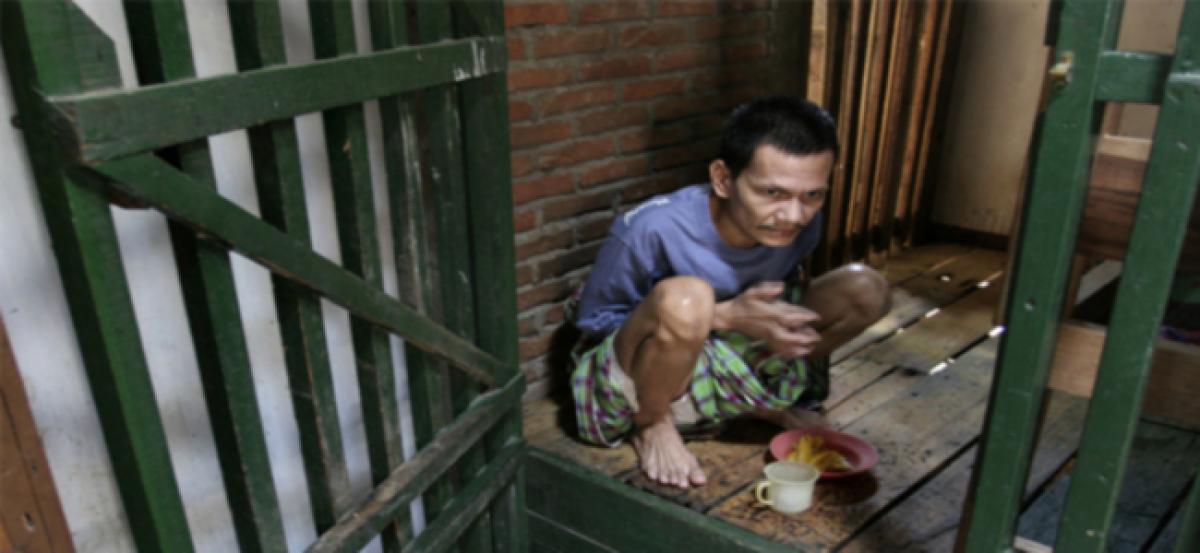Live
- Income tax refunds jump 46.3 pc to Rs 3.04 lakh crore in April-Nov
- Financial Intelligence Unit detects undisclosed income worth Rs 11,000 crore in 2024: Centre
- Odisha BJP chief to be elected in January
- AP Home Minister Anitha alerts officials amid rains in heavy Rains in Tirupati
- Taluk Guarantee panel
- Uber Launches Uber Moto Women for Safer and Flexible Rides in Bengaluru
- ‘Fear’ pre-release event creates waves
- Champions Trophy 2025 Host Change? Indian Broadcaster's Promo Sparks Controversy
- Nabha Natesh introduced as Sundara Valli from ‘Swayambhu’
- Aamir Khan praises Upendra's ‘UI: The Movie’ ahead of its release
Just In
'Living in Hell' Confined and Detained People With Mental Illness in Indonesia


Human rights advocates are calling upon the Indonesian government to crack down on the inhumane detainment of people with mental health conditions in its country.
Human rights advocates are calling upon the Indonesian government to crack down on the inhumane detainment of people with mental health conditions in its country.
A new report finds that more than 57,000 people in Indonesia with psychosocial disabilities have been chained or locked inside overcrowded or grimy rooms at least once in their lives. And roughly 18,000 are trapped in these confined spaces today, according to government data.
Human Rights Watch (HRW), an international nongovernmental nonprofit, released the report “Living in Hell,” which focuses on the neglect and abuse of the nation’s mentally ill population, on Monday morning.
To compile the information, Kriti Sharma, a researcher in HRW’s disability rights division, said she interviewed about 150 people on the islands of Java and Sumatra and visited 18 mental hospitals and similar institutions.
“The practice is basically illegal and yet the abuse continues. We found cases of people who were shackled fairly easily,” Sharma said in an interview with Yahoo News.
HRW decided to conduct research into this topic in November 2013 because it was not documented well beyond the realm of photojournalism.
Despite a 1977 government ban on pasung, the practice of shackling those with (or thought to have) psychological issues, families and traditional religious healers still lock away people or admit them to institutions where they are denied basic human rights and subjected to a variety of other abuses, according to the report.
According to HRC, Indonesia suffers from a startling lack of access to medical advice or mental health services. The country has a population of 250 million people but only 48 mental hospitals, and over half are in just four of the nation’s 34 provinces.
Data from the Indonesian Ministry of Health, which calls pasung “inhuman” and “discriminatory,” suggests that close to 90 percent of people who might want to use legitimate mental health services do not have the access.
To its credit, the government has launched several anti-pasung programs — such as “Indonesia Free from Pasung 2014” — with the goal of abolishing the practice. But that effort has not yet produced tangible results.
“It’s important to acknowledge that the government has made progress at the national level,” Sharma said. “But what we are seeing is that the rhetoric in Jakarta is not translating into practice on the ground. There is a disconnect between the national level policy and the implementation, which is extremely weak at the provincial level.”
HRW is calling on the Indonesian government to take several steps to confront this issue: (1) amend the Mental Health Act and Rights of Persons with Disabilities Bill so they comply fully with the U.N. Convention on the Rights of Persons with Disabilities, (2) monitor the practice rigorously and implement policies that prevent redress abuses, (3) teach government health workers and others about the needs of persons with mental illnesses, (4) create a confidential complaint system for victims to report abuse, (5) develop voluntary community-based mental health services and (6) work with international donors on programs and services.
The organization also launched a social media campaign — #BreakTheChains — compelling the health minister to provide mental health care at the community health centers in Indonesia as a first step.
“I do think there is hope,” Sharma said. “There are tremendous challenges but nothing that cannot be addressed.”

© 2024 Hyderabad Media House Limited/The Hans India. All rights reserved. Powered by hocalwire.com






